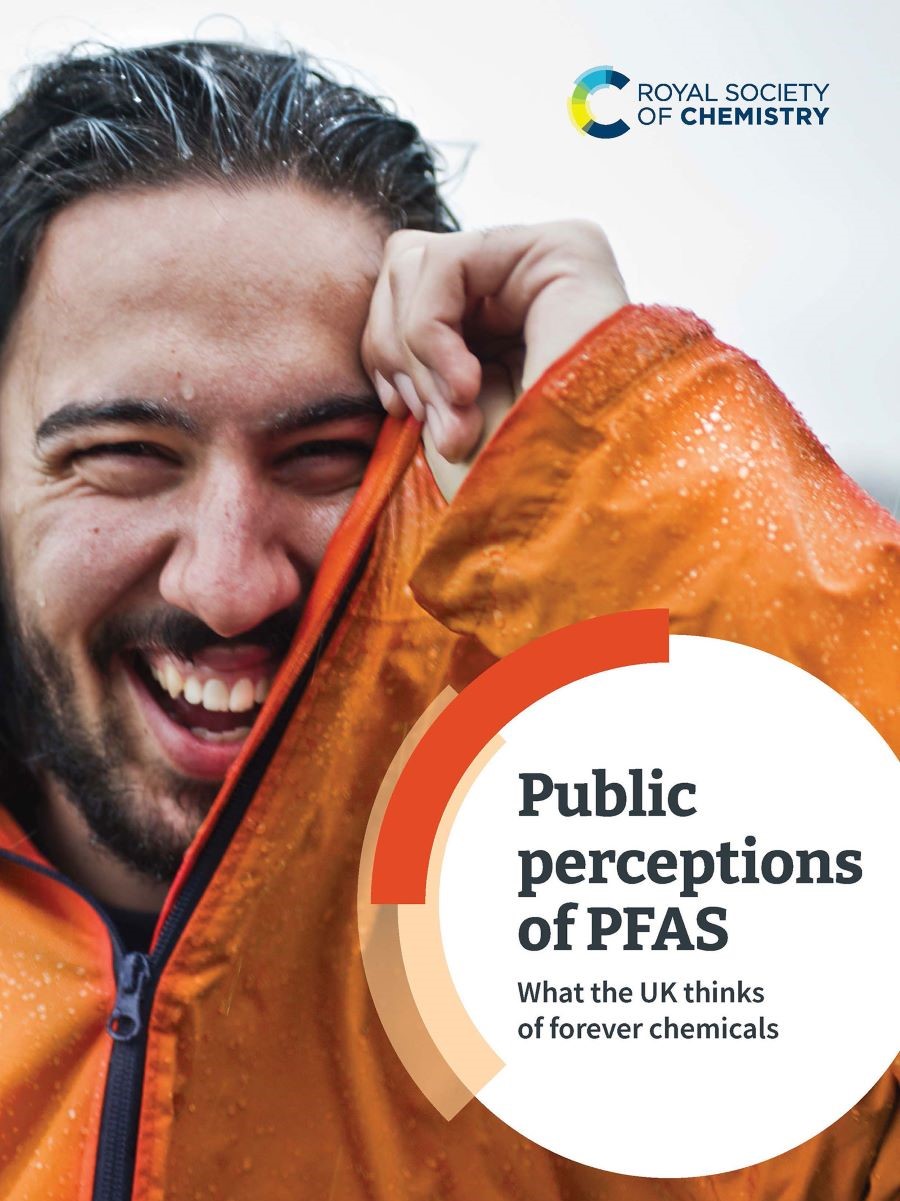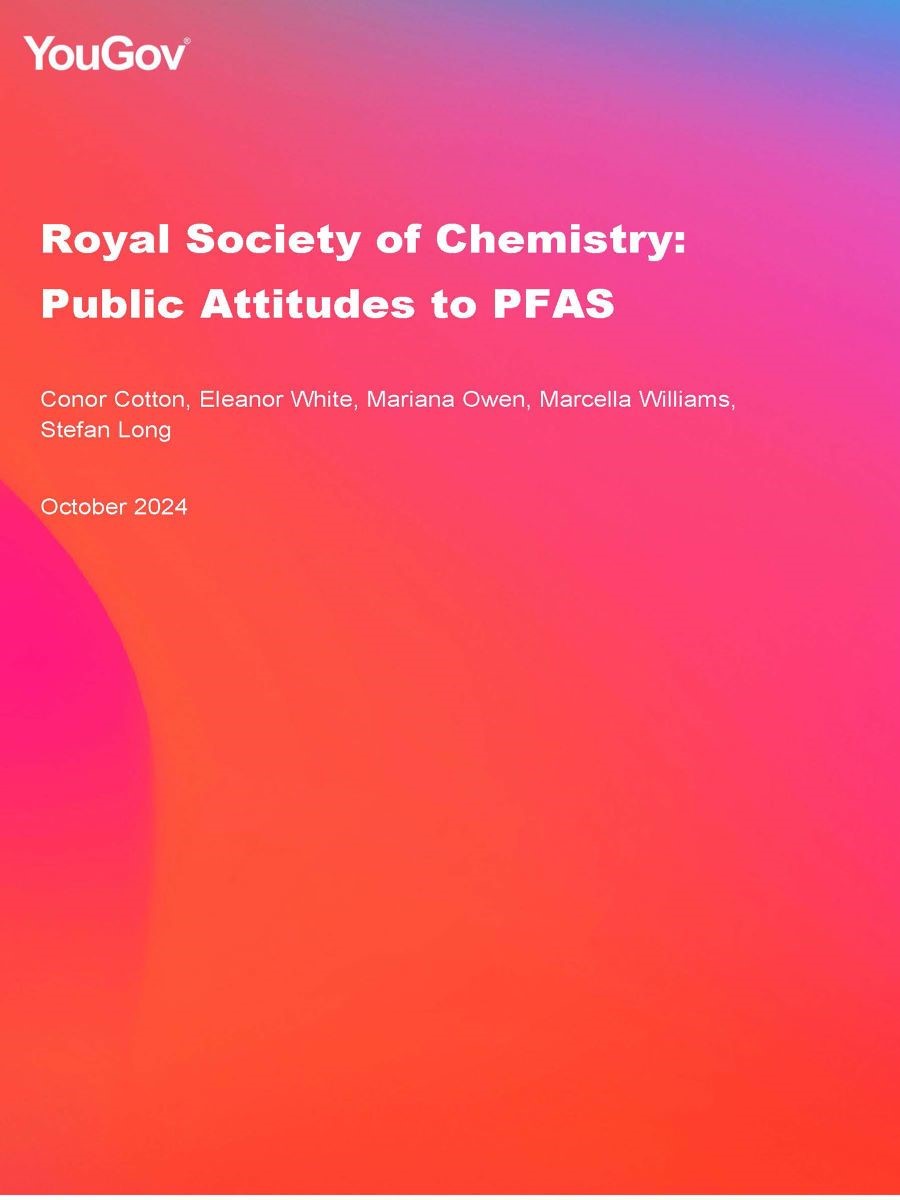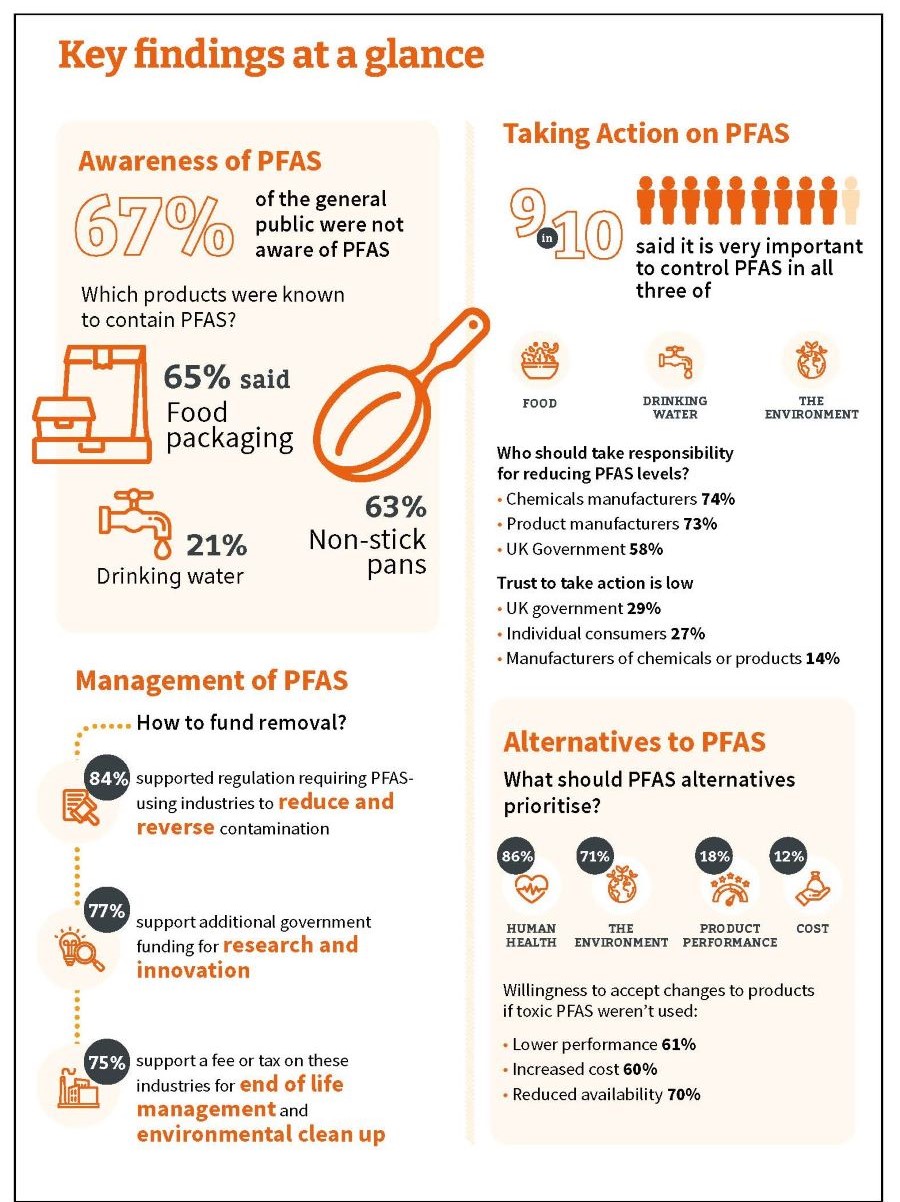First-ever survey of UK public attitudes to PFAS ‘forever chemicals’
We have undertaken the UK’s first survey of public attitudes to PFAS ‘forever chemicals’, revealing that 9 in 10 people in the UK think it is ‘very important’ to effectively control levels of the group of chemicals in food, drinking water and the environment.
The results are summarised alongside our policy positions in our short report Public perceptions of PFAS – what the UK thinks of forever chemicals, and we have also made the full YouGov report available alongside the complete data set.
PFAS are a group of more than 10,000 chemicals that are used in thousands of products, from toilet paper and non-stick cookware to firefighting foams. Some have been linked to a range of serious health issues including testicular cancer, fertility issues and developmental defects in unborn children.
Download our reports and findings:
When asked to rank who should be held most responsible for reducing PFAS levels as part of a nationally-representative YouGov survey, people most commonly said manufacturers of chemicals and products (74% and 73% of respondents respectively); at 58%, the UK Government was next highest ranked as bearing significant responsibility for change.
However, overall trust that action would be taken was low, with the UK Government being trusted by 29% of respondents, followed closely by individual consumers (27%) – while only 1 in 7 people (14%) said they trusted product manufacturers or chemical manufacturers to change.
Focus group participants emphasised that it was the Government's responsibility to create and enforce PFAS laws and regulations in order to ensure compliance from manufacturers and users of PFAS.
Our policy advisor Stephanie Metzger said: “This research complements a large body of scientific policy evidence and demonstrates clearly that people care about PFAS and that the Government should too. Citizens expect their government to use its existing powers and make new laws where necessary in order to effectively manage the manufacture, use and disposal of these chemicals.
This research complements a large body of scientific policy evidence and demonstrates clearly that people care about PFAS and that the Government should too.
“Citizens expect their government to use its existing powers and make new laws where necessary to effectively manage the manufacture, use and disposal of these chemicals. Now is the time for all MPs to use that power to protect their constituents by enshrining in law stricter standards for our drinking water.
“During a committee meeting last week on the government’s Water Special Measures Bill, Defra Minister Emma Hardy confirmed that the government has the power to do this already – stating that ‘The Water Industry Act of 1991 already provides the necessary powers to amend current regulations to deal expressly with PFAS should the Government wish to do so’ – we urge them to prioritise this on behalf of their constituents.”
The results of the study come during a critical month, as a second reading of a Private Members’ Bill on PFAS standards tabled by Munira Wilson MP is scheduled for this Friday after receiving cross-party support at its first reading.
The move follows the launch of our ‘Cleaning up UK drinking water’ campaign over a year ago, which highlighted that more than a third of water sources – our natural resource for drinking water abstraction – contained levels of PFAS classed by the Drinking Water Inspectorate as ‘high or ‘medium’ risk if used for drinking water.
In August last year, the DWI issued new guidance to water companies advising stricter limits on collective levels of 48 types of PFAS allowed in English and Welsh drinking water, but the RSC says limits need to be enshrined in law and a lower limit of 10 ng/L must be introduced for each type of PFAS, down from the current limit of 100ng/L, as well.
We are also asking Government to protect public by creating a national inventory of PFAS and enforcing stricter limits on industrial discharges.
Stephanie Metzger added: “We don’t actually know how many of these chemicals are being produced, and where they end up at the moment. New laws to protect drinking water are a crucial first step, and we also urge the government and industry to fill the gaps in our knowledge for future action by creating a national inventory of PFAS and enforcing stricter limits on industrial discharges. Ultimately, at the RSC, we want to see better strategic coordination of monitoring and regulation of all chemicals including PFAS.”
The survey also showed that 84% of respondents supported regulation requiring PFAS-using industries to reduce and reverse contamination; 75% supported a fee or tax on these industries for end-of-life management and environmental cleanup; and 77% supported additional government funding for research and innovation.
When asked what the number one priority should be for replacements to PFAS currently in use, the top priorities were human health (86% of respondents) and the environment (71%), while product performance (18%) and cost (12%) were lower priorities.
When considered by voting behaviour in the 2024 election, concern for human health and the environment are the highest priorities for all UK voters. There was also a willingness to accept changes to products if toxic PFAS weren’t used, with 61% willing to accept lower performance; 60% willing to accept the increased cost, and 70% willing to accept reduced availability.
What can you do?
Write to your MP, MSP, MS or MLA joining our call for the Government to impose new statutory drinking water standards.
Contact your water company to urge them to implement the limits above.
Public engagement
If you are an RSC member working with young people or public audiences on cleaning up water and are looking for engagement and outreach ideas you can use our resources in the members area.
About the quantitative methodology used
The findings for the quantitative portion were collected using online research methods and are based on a sample of n=4,194 adults aged 18+ in the UK. Fieldwork was carried out between 14th-27th August 2024. The research used a quota sampling approach, a non-probability sampling method which involves dividing the population up into mutually exclusive subgroups based on known population characteristics and recruiting respondents until each ‘quota’ is met. All respondents were recruited from the YouGov UK panel of over 2.5 million individuals who have signed up to take surveys. At the end of the data processing phase, the data was also weighted. All figures quoted are based on weighted data. Weighting adjusts the contribution of individual respondents to aggregated figures and is used to make surveyed populations more representative of a project-relevant population by forcing it to mimic the distribution of that larger population’s significant characteristics, or its size.
About the qualitative methodology used
YouGov’s Qualitative Team conducted 2 text-based focus groups on Monday 23rd September 2024 on the topic of understanding the public’s attitude, approach and perceptions of responsibilities towards PFAS. Participants opted into the research at the end of the quantitative survey and were selected for the groups based on their response to an open-ended question (to ensure they could respond to questions clearly through text). 10 participants joined each group, each group had a mix of demographics including age, gender, location, ethnicity and political affiliation.
Press office
- Tel:
- +44 (0) 20 7440 3351
- Email:
- Send us an email



